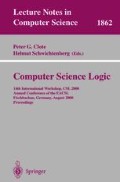Abstract
A finite model property for fully complete denotational models of propositional logics is investigated using fully complete translations to compare programming languages and logics. The main result is that there can be no finite and fully complete models of linear or affine propositional logics. This is shown to be a consequence of Loader’s result that contextual equivalence for finitary PCF is not decidable by giving a fully complete translation from finitary PCF into a Λ(Ω)ω bda-calculus for a dual affine/non-linear logic. It is shown that the non-linear part of this logic does have a finite and fully complete model, and a conservative extension of the above translation is given from finitary PCF with control (µPCF) into the non-linear fragment which shows that the fully abstract model of µPCF is effectively presentable.
Access this chapter
Tax calculation will be finalised at checkout
Purchases are for personal use only
Preview
Unable to display preview. Download preview PDF.
References
S. Abramsky. Axioms for full abstraction and full completeness. In Essays in Honour of Robin Milner. MIT Press, to appear.
S. Abramsky and P.-A. Mellies. Concurrent games and full completeness. In Proceedings of the 14th annual Symposium on Logic In Computer Science, LICS’ 99, 1999.
S. Abramsky, R. Jagadeesan. Games and full completeness for multiplicative linear logic. Journal of Symbolic Logic, 59:543–574, 1994.
S. Abramsky, R. Jagadeesan and P. Malacaria. Full abstraction for PCF. Accepted for publication in Information and Computation, 1996.
A. Jung and J. Tiuryn. A new characterization of lambda definability. In Typed Lambda Calculi and Applications, number 664 in Lecture notes in Computer Science. Springer-Verlag, 1993.
A. Barber. Dual intuitionistic linear logic. Technical Report ECS-LFCS-96-347, LFCS, University of Edinburgh, 1996.
P.N. Benton. A mixed linear and non-linear logic: Proofs, terms and models. Technical Report 352, Computer laboratory, Cambridge University, 1994.
G. Berry and P.-L. Curien. Sequential algorithms on concrete data structures. Theoretical Computer Science, 20:265–321, 1982.
R. Cartwright, P.-L. Curien and M. Felleisen. Fully abstract semantics for observably sequential languages. Information and Computation, 1994.
J.-Y. Girard. Linear logic. Theoretical Computer Science, 50, 1987.
J.-Y. Girard. On the unity of logic. Annals of Pure and Applied Logic, 59:201–217, 1993.
J.-Y. Girard. On denotational completeness. Theoretical Computer Science, 197, 1995.
M. Hasegawa. Logical predicates for intuitionistic linear type theories. In Proceedings of TLCA’ 99, 1999.
J. M. E. Hyland and C.-H. L. Ong. On full abstraction for PCF: I, II and III. to appear, 1995.
A. Jung, and A. Stoughton. Studying the fully abstract model of PCF within its continuous function model. In Proceedings of the International Conference on Typed Lambda Calculi and Applications, volume 664 of LNCS, 1993.
A. Kopylov. Decidability of linear affine logic. In Proceedings of the 10th Annual IEEE Symposium on Logic in Computer Science, LICS 95. IEEE press, 1995.
Y. Lafont. The finite model property for various fragments of linear logic. Journal of Symbolic logic, 62:1202–1208, 1996.
J. Laird. A Semantic Analysis of Control. PhD thesis, Department of Computer Science, University of Edinburgh, 1998.
P. Lincoln. Deciding provability of linear logic formulas. Cambridge University Press, 1995.
P. Lincoln, J. Mitchell, A. Scedrov and N. Shankar. Decision problems for propositional linear logic. Annals of Pure and Applied Logic, 56:239–311, 1992.
R. Loader. The undecidability of lambda definability. to appear in the Church Memorial volume, 1993.
R. Loader. Finitary PCF is undecidable. Manuscript, 1997. To appear in Theoretical Computer Science.
R. Loader. Unary PCF is undecidable. Theoretical Computer Science, 206, 1998.
R. Milner. Fully abstract models of typed lambda-calculi. Theoretical Computer Science, 4:1–22, 1977.
C.-H. L. Ong and C. Stewart. A Curry-Howard foundation for functional computation with control. In Proceedings of ACM SIGPLAN-SIGACT syposium on Principles of Programming Languages, Paris, January 1997. ACM press, 1997.
V. Padovani. Decidability of all minimal models. In M. Coppo and S. Berardi, editor, Types for proofs and programs, volume 1158 of LNCS. Springer, 1996.
M. Schmidt-Schauß. Decidability of behavioural equivalence in unary PCF. Theoretical Computer Science, 208, 1998.
T. Streicher. Denotational completeness revisited. In Proceedings of the International Conference on Categories in Computer Science, CTCS’ 99, Electronic notes in theoretical computer science. Elsevier, 1999.
Author information
Authors and Affiliations
Editor information
Editors and Affiliations
Rights and permissions
Copyright information
© 2000 Springer-Verlag Berlin Heidelberg
About this paper
Cite this paper
Laird, J. (2000). Finite Models and Full Completeness. In: Clote, P.G., Schwichtenberg, H. (eds) Computer Science Logic. CSL 2000. Lecture Notes in Computer Science, vol 1862. Springer, Berlin, Heidelberg. https://doi.org/10.1007/3-540-44622-2_26
Download citation
DOI: https://doi.org/10.1007/3-540-44622-2_26
Published:
Publisher Name: Springer, Berlin, Heidelberg
Print ISBN: 978-3-540-67895-3
Online ISBN: 978-3-540-44622-4
eBook Packages: Springer Book Archive

